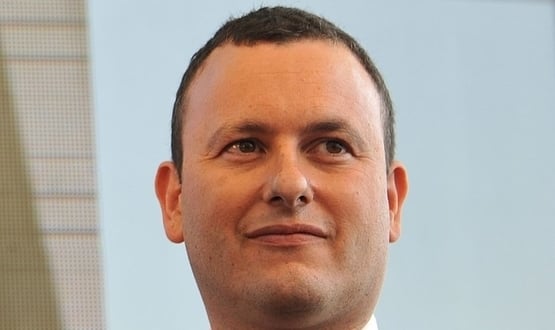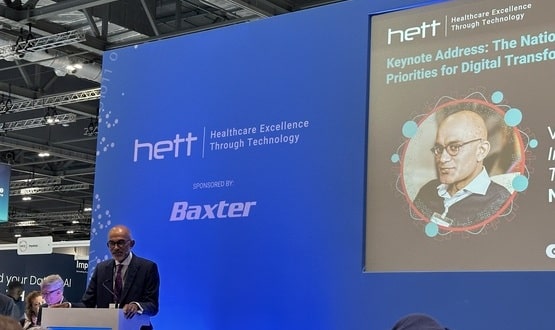Matthew Gould leaves NHS England and Improvement
- 4 May 2022

The former CEO of NHSX has left NHS England and Improvement, Digital Health News has learned.
Matthew Gould officially left as national director for digital transformation at NHS England and Improvement, and director general for digital transformation in the Department of Health and Social Care (DHSC), at the end of April. The role, which he took on after the NHSX brand was disbanded in January, meant Gould had oversight of the “joint digital policy and strategy team”.
Before the brand was retired, Gould was the CEO of NHSX – a transformation unit set up by former secretary of state Matt Hancock in 2019 to accelerate digital innovation in the NHS.
In a note to staff, Gould also confirmed that Simon Madden and Catherine Pollard would be heading up the Digital Transformation Directorate of DHSC.
“The work we have done together over the past three years has been the most important of my career,” he added.
“We have changed the trajectory of the NHS and social care, helped both through the pandemic, and touched millions of lives through the changes we have brought.
“We have forged brilliant partnerships, and done a pretty good job at being the open, creative, respectful team we wanted to be.”
During the Covid pandemic, NHSX was charged with developing the NHS Covid-19 App. Gould and NHSX came under intense public scrutiny for repeated delays to the app and the technical approach chosen.
More successful projects were rapid action on national deals for Attend Anywhere, AccuRX and Microsoft Teams, that supported remote care and working, and strong guidance to encourage data sharing.
Gould was praised for ensuring he developed a dialogue with a wide variety of local NHS IT leaders and other arms-length bodies to understand their priorities.
Dr James Reed, who is chair of the Digital Health CIO Network, said: “I well remember the excitement that surrounded Matthew’s appointment to NHSX.
“I always felt that he was genuinely interested in the work we were all doing and was keen to do what he could to support it. He also showed a direct interest in the networks which was very refreshing, and took time out to speak to us on many occasions.
“He was helpful in giving us influence in areas we had not reached before, including for a brief period to the Secretary of State himself. In general terms I always felt that the agenda pursued by NHSX in terms of promoting interoperability was the right one. So this marks the end of a brief era, and I wish him well for the future”
Up until the abolition of NHSX, the organisation had been pursuing a digital strategy broadly based around interoperability and targeted investments to raise levels of digital maturity.
Though Digital Health News understands that since the appointment of Dr Tim Ferris as director of digital transformation at NHS England and NHS Improvement, the focus has dramatically shifted away from interoperability to standardisation on common systems, particularly Epic.
Before joining NHSX, Gould was the government’s director general for digital and media policy for 3 years. Prior to that he was British Ambassador to Israel and the UK government’s Director of Cyber Security. He has also done postings in Tehran, Islamabad, Washington and Manila.
Digital Health News understands that news of Gould’s departure has not been confirmed due to delays in agreeing an official announcement.





4 Comments
“the focus has dramatically shifted away from interoperability to standardisation on common systems, particularly Epic.”
This is an incorrect view of what standardisation is in Digital Health and will essentially lock NHS organisations into using one or two supplier systems. While that may not necessarily be a bad thing, if the products are able to continuously meet the ever changing NHS requirements, it may have a negative effect on innovation in the market and discourage new suppliers with better products and services from entering the NHS.
On the point about ‘standardisation’, this term has always been used to refer to the common standards – messaging, terminology or otherwise – that have, and are being developed (HL7 v2, FHIR, SNOMED CT, etc.) to ensure semantic interoperability between health IT systems regardless of the manufacturer. Moving to one supplier for NHS secondary care organisations, and using their system as the ‘standard’ is very different from the concept of standardisation in health IT, and I fear may have implications that we may eventually come to regret.
Matthew was a refreshing change from the various other IT leaders who have come and gone. I only ever met him via Teams but I am genuinely sad to see him leave the merged NHSE/I/X/D organisation. I’d echo Dr. Reed’s comments in the article that he genuinely appeared to listen, to the supplier community as well as clinicians and other stakeholders.
As for standardising on single suppliers, that’s been a detectable trend for 3+ years now. We’ve been here before… but does anyone now in the national NHS digital organisation now remember NPfIT, or have the read the numerous Public Accounts Committee reports on it…? Very glad Digital Health is still here to offer some organisational memory!
The idea of standerising on a single system is a mad one. Even if a single system existed that could meet the diverse needs of English health and care and even if it was undeniably the best today, it wiil not be forever be so.
Epic is probably the best choice today if you want a megalithic EPR for an acute hospital and can afford it, but it won’t do it all and it certainly won’t meet the broader needs of NHS and social care. Also Epic was designed back in the last century for the most expensive and broken health care system in the developed world, it’s not what we need for the NHS.
Unless we want to end up with with a health and care system that costs us twice as much, generates profits for US health megacorps, and fails to deliver to those who most need it, we should not be taking the advice of a US physician executive as to how we best transform the NHS for the 22st century
Game over player 1
Comments are closed.